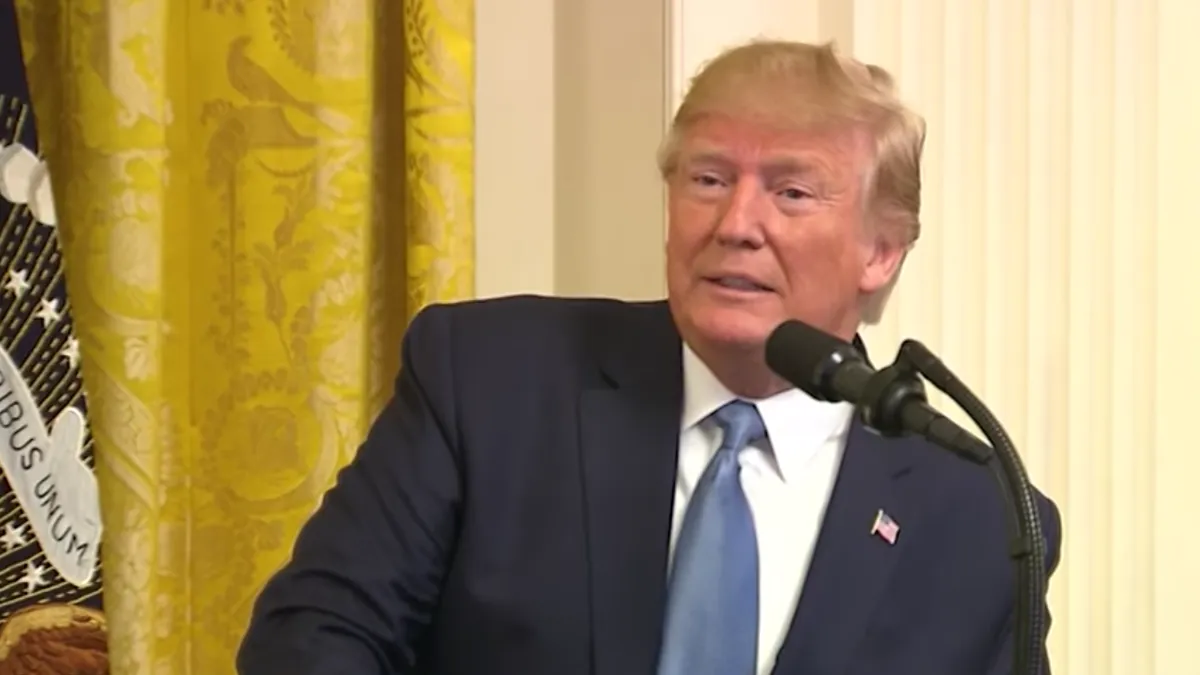Dive Brief:
- President Donald Trump on Tuesday ordered federal agencies to ease regulatory burdens to spur economic recovery following a surge in unemployment.
- Environmental group Natural Resources Defense Council (NRDC) said the Environmental Protection Agency already has cut too many protections since the pandemic began and the Senate Environment and Public Works Committee's minority staff called EPA's actions a "pandemic of pollution."
- Utilities may be more troubled by unpaid utility bills than burdensome regulations and say they need clear guidance from federal agencies on payment flexibility.
Dive Insight:
President Trump on May 19 signed an executive order directing federal agencies to ease up on enforcement and relieve regulatory burdens to spur economic recovery following a surge in unemployment due to the coronavirus pandemic. While Democrats and environmentalists may be anxious about regulatory rollbacks, industry groups say they have more pressing concerns, like unpaid utility bills.
"A surge in unemployment coupled with mandatory or voluntary moratoriums on service disconnections in 46 states is expected to increase the balance of unpaid electric bills to $2.6 billion through 2022," the National Rural Electric Cooperative Association said in a statement.
Trump cited 36 million new claims for unemployment insurance benefits as a sign of the pandemic's impact and a need for regulatory relief. The executive order instructs federal agencies to identify rules that could be temporarily modified, rescinded, or waived to promote economic recovery. Agencies also were instructed to consider issuing exemptions from regulatory requirements and exercising discretion in enforcement. Agencies would review any temporary rule changes that could be made permanent.
The order met with immediate objections from NRDC.
"When you hear the Trump administration say it wants to eliminate 'red tape,' think: protections Congress ordered agencies to put in place to protect you and me from coronavirus, air pollution, and a whole host of other harms that can make us sick and even kill us," Gina McCarthy, president and CEO of NRDC, said in a statement.
McCarthy expressed particular concern about deregulatory action at the EPA.
"And as far as EPA is concerned, finding more 'red tape' will be like getting blood from a stone. During the pandemic alone, EPA has moved to increase our exposure to mercury, soot, toxic chemicals and perchlorate. What's left to cut?" McCarthy asked.
The EPA also received criticism from Democrats in Congress.
Minority staff of the Senate Environment and Public Works Committee released a list of EPA actions, entitled "A Pandemic of Pollution: How EPA Air Pollution Actions Since March 1, 2020 Will Harm Public Health and Potentially Add to COVID-19 Risks." These actions include an April decision that compliance with the Obama-era Mercury and Air Toxics (MATS) rule is too costly for coal and oil-fueled power plants.
The report also criticized an EPA proposal leaving the National Ambient Air Quality Standards (NAAQS) for particulate matter unchanged. Former EPA scientific advisors have found the current standards are not scientifically justifiable, and research from Harvard University links higher particulate matter levels with higher death rates from COVID-19, the Senate report noted.
"A small increase in long-term exposure to PM2.5 leads to a large increase in the COVID-19 death rate," Harvard researchers concluded. Their findings have not yet gone through peer review.
Industry groups do have pressing concerns in the midst of the pandemic, but not with regulations. NRECA is concerned about unpaid utility bills due to the surge in unemployment and mandatory or voluntary moratoriums on service disconnections.
"Policymakers should be mindful of the economic threat facing rural communities and their electric cooperatives by taking steps to prevent the possibility of significant disruptions," NRECA CEO Jim Matheson said in a statement.
NRECA last week asked House Speaker Nancy Pelosi, D-Calif., and Minority Leader Kevin McCarthy, R-Calif., to include measures in stimulus legislation to give electric co-ops flexibility and relief. NRECA's requests include:
- Flexibility to reprice Rural Utility Service (RUS) loans to currently lower interest rates without requiring pre-payment penalties,
- Increased lending under the RUS Guaranteed Underwriter Program,
- Increased federal assistance for utility payments,
- Assurances that energy cooperatives are eligible for assistance under the Paycheck Protection Program, and
- Federal investments in rural, high-quality broadband.
The Electric Power Supply Association is seeking guidance from federal agencies as state stay-at-home orders expire.
"EPSA is engaged with federal agencies to get clear guidance as needed while our members continue to focus on providing safe, reliable, affordable power to support the nation's economic recovery," Todd Snitchler, EPSA president and CEO, said in an email to Utility Dive.
Both EPSA and the American Public Power Association told Utility Dive they are evaluating the executive order's impact on their members.














